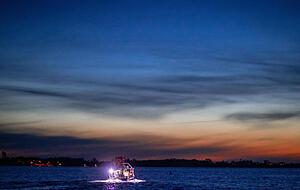March 23, 2021, 10:10 pm<br/>
Brussels (dpa) European Agriculture Ministers have agreed on fishing quotas – but the final round is still ahead. There is also no indication of an agreement regarding the second major construction site.
European Union countries agreed to temporary fishing quotas by the end of July.
This will ensure that European fishing companies can continue their business after March 31, said Ricardo Santos, Portugal’s Minister of Maritime Affairs and current chair of the ministerial meeting. According to the European Union’s Commissioner for Fisheries, Virginius Sincivius, the agreement stipulates that the total catch will correspond to seventeen scientific recommendations for 2021.
The background to this is negotiations with the United Kingdom over shared assets. After the British left the European Union, there was a complex dispute over the total catch and its distribution. At times, negotiations on a trade pact on Brexit threatened to fail over the fish issue. After the agreement between the countries of the European Union, the next step will be to continue negotiations with Great Britain. Sinkevi explained? Ius says the agreement provides for total initial catches by July 31.
Since Brexit negotiations continued until Christmas 2020, EU countries only agreed to temporary hunting rules in mid-December for shared stocks with the UK. Many fish stocks are depleted or endangered. Environmentalists have long called for more fishing restrictions to be imposed in order to protect ecosystems from severe damage.
The meeting’s second major construction site is the imminent reform of the European Union’s multi-billion dollar Common Agricultural Policy. Today the Council of Agriculture is spinning over potential settlement lines with the European Parliament on the Common Agricultural Policy, on Twitter by Federal Agriculture Minister Julia Klikner (CDU). The European Union countries are currently trying to agree on a common line with the European Union Parliament. The Green Group complains that national ministers are unwilling to make concessions.
And Martin Hosling, spokesman for the agricultural policy of the Green Party in the European Parliament, predicted this afternoon that the negotiations between Parliament and the European Union countries due to take place on Friday would end in chaos. So far, MEPs have not had an agenda and no middle lines have been introduced by the European Union Commission and national agriculture ministers. In the evening, the Commissioner for Agriculture of the European Union Janusz Wojczovsky was more optimistic. He is confident that there will be an agreement in May.
The sticking point in the negotiations between the European Union and Parliament is how to make agriculture more environmentally friendly in the coming years. Among other things, it concerns the question of whether the so-called common regulations should be determined at the European level or only at the national level. While Parliament calls for people to have a say at the level of the European Union, the countries of the European Union support national sovereignty. There are also different views on how much CAP money should be paid out on the basis of common regulations. Parliament supports 30% and Member States 20%.
dpa-infocom, dpa: 210323-99-938198 / 4

“Award-winning music trailblazer. Gamer. Lifelong alcohol enthusiast. Thinker. Passionate analyst.”







